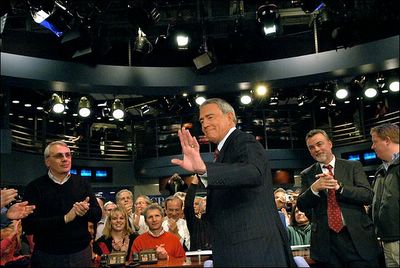Thursday, March 10, 2005

March 10, 2005
THE TV WATCH
Signing Off, Rather's Wish for Viewers Is Still 'Courage'
By ALESSANDRA STANLEY
an Rather resigned as CBS News anchor with the same closing exhortation that brought him such ridicule soon after he took over from Walter Cronkite 24 years ago to the day: "Courage."
Dry-eyed and calm, Mr. Rather told his viewers last night that he wished courage to the mourners of Sept. 11; to soldiers, sailors and journalists in harm's way; to tsunami and other natural disaster victims; and to all those oppressed by financial burdens or failing health. But it was also Mr. Rather's way of telling the world that he left his post without remorse or regrets. On his final broadcast, Mr. Rather delivered one last act of on-air brinkmanship - a dance along the fine line between reporting and posturing.
Mr. Rather prides himself on his toughness, but his last days on the job mostly revealed his hunger to explain himself in the wake of the flawed "60 Minutes" report about President Bush's National Guard service that tainted his and CBS's reputations and forced him out a year earlier than he had intended. In his last few broadcasts, and most noticeably in last night's hourlong tribute on CBS, "Dan Rather: A Reporter Remembers," Mr. Rather insistently wrapped himself in the romance of the old-fashioned reporter equipped with only a passport, notebook and trenchcoat. Toward the end of the tribute, Mr. Rather said, somewhat wistfully, "When I walk down the street, I want people to say, there goes a real reporter."
Naturally, when people notice him, they will say there is that famous former network anchor.
His 42-year career in broadcasting was as distinguished as it was jagged, but perhaps more than any other television journalist he embodied the tension between television and journalism; he was the newsman who most ostentatiously put himself at the center of every story, at times literally tying himself to a telephone pole under rain and wind to illustrate two things at once: how terrible the hurricane was and how dedicated he was to describe it. (In the tribute, Mr. Rather cited Edward R. Murrow's rooftop dispatches from London during the Blitz as his inspiration, but his style was at times even more vainglorious - "I am there." )
Television has always had a symbiotic relationship with news events. Stories are never just about the pictures, they are also about the person posing against the backdrop of a flood, a battle or a famine, lending authoritative presence to a crisis but also leeching attention away from the event.
And Mr. Rather's propensity to put himself forward is as much part of his legacy as all the major events he covered, from the Kennedy assassination to the Vietnam War, Watergate, all the way to Sept. 11. On ABC last night, Peter Jennings alluded to it in his generous tribute to his departing rival. "A word about Dan Rather, who is winding up his last night as the anchor of the "CBS Evening News," Mr. Jennings told his viewers. "You've surely heard about that. Dan - more than any other newsman in America, I think - has always made news, as well as covered it, though that was not necessarily his intention." (NBC's new anchor, Brian Williams, gave a shorter but kind adieu.)
In their day, Mr. Jennings and NBC's Tom Brokaw also did their fair share of showboating - trolling the West Bank in safari jackets or riding bicyles through Beijing at the time of Tiananmen Square. But it was Mr. Rather who returned from Afghanistan with the nickname "Gunga Dan" and stormed off the set when CBS delayed the broadcast for a tennis championship, leaving the network with dead air for seven minutes. He always went a bit further in blurring the lines between actor, news reader and newsman. Mr. Rather fancies himself as a reporter who uneasily wore the crown of anchor - a conceit that grew tiresome, rather like a chief of police who constantly tells his officers that he longs to be back on the street, working stakeouts and collaring perps.
He was a riveting figure in the field. On the anchor desk, his combative, often emotive personality and florid way with homespun metaphors could grate. But his sincerity was never in doubt, not even by the right-wing critics who lambasted Mr. Rather as the poster child of liberal bias in the mainstream media.
At the close of his final broadcast, Mr. Rather was given a standing ovation by dozens of CBS employees gathered around his desk, a show of solidarity that clashed with the peevish mutterings of newsmen and executives higher up in the network chain of command. The network's grumpy old men, from Mike Wallace to Don Hewitt, took potshots at Mr. Rather at his most vulnerable moment, undermining any lingering claim they had to being the Wise Men of the Tiffany Network. Walter Cronkite was the worst, emerging from his twilight to tell CNN that he wished Bob Schieffer had replaced Mr. Rather years ago.
Mr. Rather's attempts to defend himself, however, spoke more of an aging anchor's self-delusion than self-knowledge. "Too much passion melded to loving the work leads to making mistakes," Mr. Rather said in the hourlong tribute. "I would rather have too much than not enough."
The mistake that led to last night's premature farewell was more mundane than that. The final indignity for Mr. Rather wasn't just that his career ended on a mistake, but that the flawed "60 Minutes" story trapped him in the role he most despised: an overextended news reader who relied, too blindly, on the shoddy reporting of his producers.
Copyright 2005 The New York Times Company
